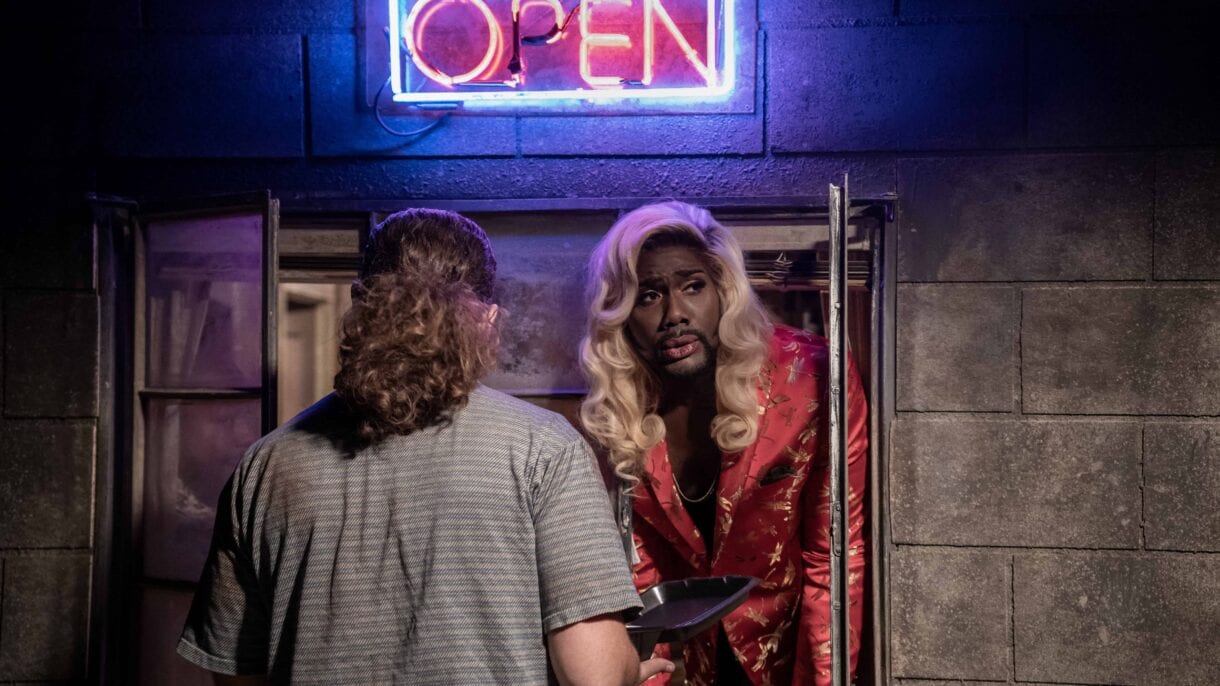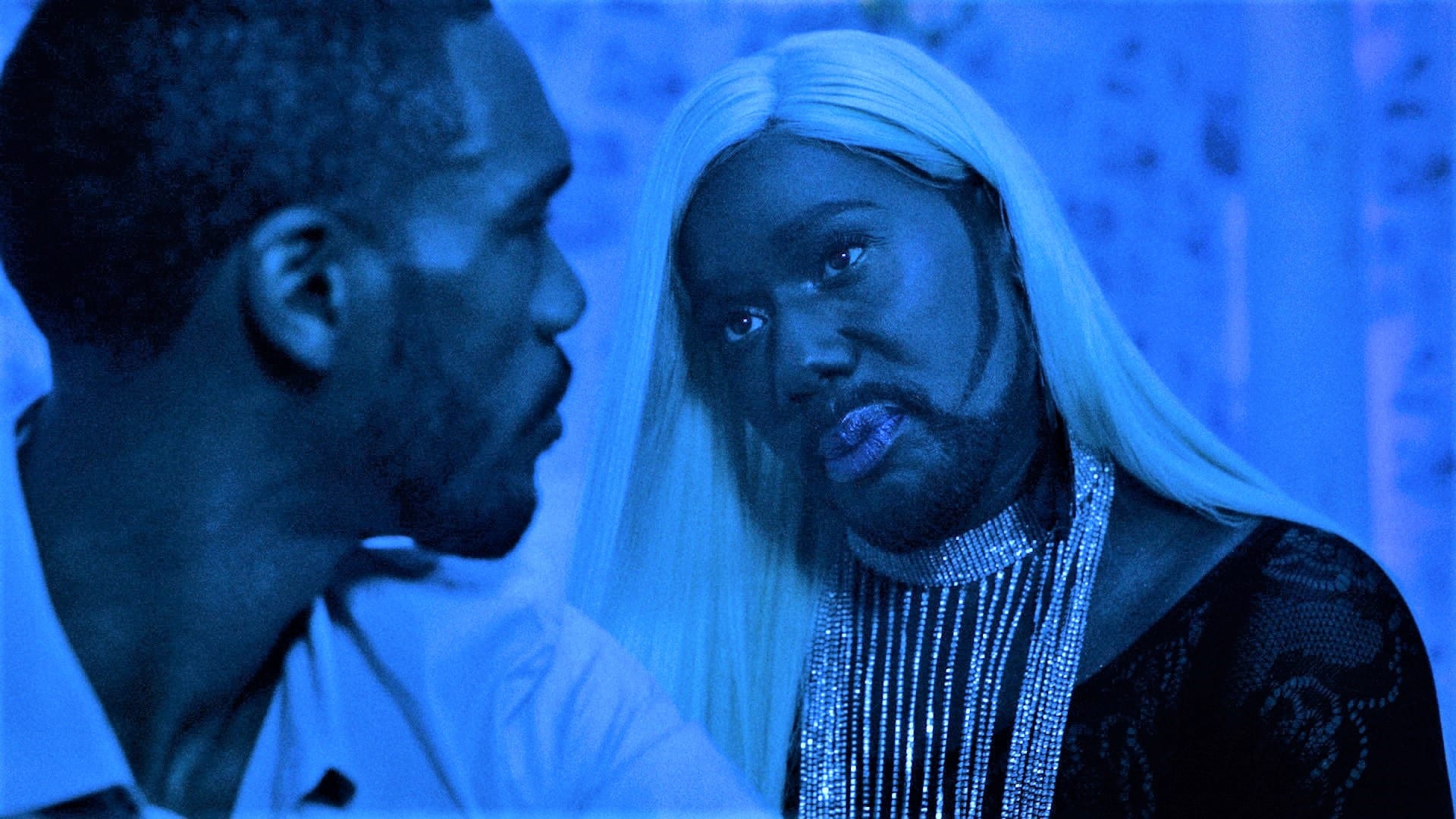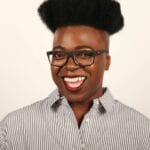Being Black, queer and gender nonconforming, it’s hard to come by film and television characters that fully reflect my lived experience. I’ve often just found solace in Black gay, effeminate characters like Noah (Darryl Stephens) in Noah’s Arc, Lafayette (Nelsan Ellis) in True Blood or the oft-unnamed sassy hairdresser that populates the periphery of nearly every production. But with Nicco Annan’s portrayal of the non-binary Uncle Clifford in Starz’s new drama P-Valley (Canadians, click here), I’m seeing, perhaps for the first time, a lived experience as complex as mine rendered on screen. When I share this observation at the start of my phone interview with Annan, who is gay, he halts the interview. “Yes!” he exclaims, thanking me for my stamp of approval. “That was so important to me. “With this character, I did not want to get it right. I wanted to get it true.” P-Valley—from the mind of noted playwright Katori Hall, who also serves as the series showrunner—centres on a popular strip club called The Pynk in a fictional Mississippi town. Uncle Clifford (who uses she/her pronouns) is The Pynk’s owner and mother hen, managing a group of strippers including newbie Autumn Night (Elarica Johnson), who’s running away from her past; and Mercedes (Brandee Evans), who’s so popular at the club she headlines her own night. Two episodes in, the hour-long, stylized drama (with plenty of comedy) based on Hall’s play, Pussy Valley, is appointment television, intimately revealing the full lives behind sex workers. Annan, whose TV credits include This Is Us, Claws, and Snowfall, has lived with Uncle Clifford’s character almost since its inception, having played her in the theatrical version. He came into Hall’s orbit and to the role through a mutual friend of theirs. Annan was already a fan of Hall because, he says, “of the reflective attributes that I saw in her work. And so when I read the script, the stage direction said, ‘She emerges from the shadows, eyelashes like butterfly wings and nails like eagle talons. She is masculine and feminine in equal measure.’ I was like, ‘What the hell is this? I’m here for it!’” He found the description of Uncle Clifford intriguing because it bucked the conventional approach he was taught about being an actor who is also gay. “I grew up under that pedagogy that in order to be good as an actor, you had to play straight,” he says, describing how professors made it seem like he would have less of a career if he couldn’t “turn it off.” But with this role, he could bring parts of his own lived experience to his performance; he didn’t have to hide. After Annan had played Uncle Clifford through the workshop phase and full production of the play, the opportunity to audition for the television adaptation came along. And he saw it as just that: an opportunity to continue telling a Black queer story. I caught up with Annan a couple weeks into P-Valley’s premiere season. We discussed how he got inspired to play Uncle Clifford, where the character fits in to the broader Black queer media lexicon and what he hopes Black queer people take away from the show. Slight spoilers for the first two episodes ahead.
Let’s start with the basics. I know you’ve lived with this character for some time, but how did you go about getting into character?
I’m a gay man so I have a lot of gay-themed profiles that I follow on my social media, as well as non-LGBTQ ones. I see so many straight men putting on wigs as a joke. We know the history of comedians using apparel and femininity as a sign for humour, and the ideas and conversations that people have said about the emasculating of Black men in Hollywood, right? For me as an artist and as a gay Black man, I said, “There is truth to be told here.” Uncle Clifford was an opportunity, I felt, for people to be able to get to know Black people on the [LGBTQ] spectrum in a more intimate way.
One of the things I love most about Uncle Clifford is that she is very much integrated into the community. She’s a leader of sorts and moves through the world as she wants to. I’m wondering: Was there an Uncle Clifford in your life that you pulled some inspiration from?
The character is, in its conception, a fusion of three people in Katori’s life: her mother, her father and her real Uncle Clifford. And I have met all three. For me personally, as an actor, there wasn’t one person because I feel that [Uncle Clifford] can be all people. It was the circumstances that really forged her character for me. But I did have an Uncle Bill, and Uncle Bill was—they didn’t say “gay.” They said he was “sweet,” back in the day. My Uncle Bill had a lot of bangles and bracelets, and those bracelets were kind of like bells to me. You heard him when he was coming. You heard when he was leaving. You knew when he was upset because that wrist just got going.
I love that story because we don’t often talk about the queer people who came before us—and that can perpetuate this false notion that all Black queer and trans people experience immense trauma in our identity formation.
It was important to highlight that while many of us have had trauma and have had such dark and hateful and hurtful experiences, there is also love. Because myself, as a gay man, I had the hardest, “Thuggish Ruggish Bone” cousins that rock for me all day long and there has never been a question. I wanted to highlight that there are some good cishet Black men and Black women out here. Black queer people are a part of our community as Black people. And even in the South, along that Bible Belt, it’s important that we show that. And just like we are seeing more Black trans visibility and Black non-binary visibility on TV, I feel that we have to be able to see [those community members in] healthy relationships as well for people to be able to understand that it can happen and to see how “normal” or “regular” it is.
I know that Patrik-Ian Polk, one of the fathers of modern Black queer cinema, is involved in P-Valley as a co-executive producer. He gifted us the greatness that is Noah’s Arc and Punks, two iconic representations of Black queer folks. How do you feel Uncle Clifford, as a character, fits into the broader context of Black queer representation on TV?
My goal in portraying her is that you will see all of the things that you have seen before in other representations and more, meaning: you get to come with Uncle Clifford behind the curtain, see what she’s really like. You get to go home with her. For me, Uncle Clifford is the central engine for the story. I think that people will be able to see her humanity, and my hope is that people are able to see the humanity of Black queer lives [outside of television].

Nicco Annan in "P-Valley." Credit: Courtesy of STARZ Entertainment
What has the response been like from viewers thus far?
From the airing of the first episode, there have been so many responses from people that are not in my circle, whether that’s on Twitter or Instagram. I’m seeing responses from women that are in their 50s, as well as those that are in their 20s. Men of all ages are responding. A friend from Detroit called me and told me about his 67-year-old Black uncle who is [watching and enjoying the show]. I’m just like “Wow, the seed of hope is being planted.” That’s something, and they’re getting the medicine in the Kool-Aid. That makes me so happy because we, as a people, are more open I think than society gives us credit for. And yes, there are those out there, I’m sure, that have negative comments, but what’s amazing to me is that I haven’t seen it—and it’s not because I ain’t looking. I think that in the lexicon of characters, she’s really going to give a lot of freedom and authenticity and permission.
Is there anything in particular that you hope other Black queer and gender expansive people get from Uncle Clifford?
I hope that when other thick, Black gay boys and thin, Brown gay girls and non-binaries that are thick and thin see this character, they see pieces of themselves. Because Uncle Clifford is not the only character that’s on the spectrum of the LGBTQ rainbow in the show.
I’m glad you brought that up because I do want to talk a little bit about the arc with Lil Murda (J. Alphonse Nicholson). I don’t want to spoil anything but let’s just say there’s some intimacy shared between Uncle Clifford and this aspiring rapper who’s exploring his sexuality. This is an important arc for a number of reasons.
I feel like I’m on a soapbox, but I’m going to say it: I hope that people get that people have grown and things have changed. There’s an evolution that has happened in our world and society, and white gay men, traditionally, have been more free to do whatever they want to do and express their sexual desires without certain ridicule. I think that over time we are able to see Black people express things more openly without that ridicule—whether that is a fetish, whether that is fashion or whether that is sexuality and exploring what a person may like. The story of the down-low brother and the LGBTQ person being hurt or whatever—that’s the regular story. We’ve seen that before. I think with this arc, it’s important to me to show how men— Black men, specifically—have evolved. And it’s also a mirror to other queer people, [showing] how we can have so many walls up, be so free in so many ways, but when it comes to the heart, we all know all too well that there can be like a granite stone-like mountain around it. To be able to let that go and embark on the journey of letting love in is also possible.


 Why you can trust Xtra
Why you can trust Xtra


